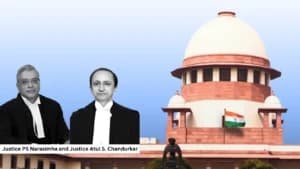The Jharkhand High Court has declared unconstitutional Section 22-A of the Registration Act, 1908, as amended by the Bihar Amendment Act 6 of 1991 and adopted by Jharkhand. The provision gave the State Government power to cancel document registrations on the vague ground of "public policy." A Division Bench of Chief Justice M.S. Ramachandra Rao and Justice Rajesh Shankar delivered the ruling in multiple writ petitions, including one filed by the Chotanagpur Diocesan Trust Association (CNDTA).
Read Also:- Jharkhand High Court Equips 496 Judicial Officers with Samsung Tablets to Enhance Digital Workflow
The controversial section allowed the government to declare, via official notification, that registration of any document or class of documents could be considered against public policy. Once notified, registration officers were mandated to refuse such registrations.
This provision was challenged in several petitions, including W.P.(C) No. 5088 of 2018 and connected matters. The petitioners argued that the clause lacked legal clarity and placed excessive power in the hands of the Executive, allowing arbitrary interference with property rights.
The Court referred to the Supreme Court’s 2005 decision in State of Rajasthan vs. Basant Nahata, which struck down a nearly identical provision. The apex court had observed:
Read Also:- Jharkhand High Court Delivers Judgments in 4 Criminal Appeals After Supreme Court's Intervention
“Public policy is a vague and uncertain concept. It cannot be precisely defined, and interpretation must remain within the limited domain of the judiciary.”
The Supreme Court had firmly held that:
“What lies within the exclusive domain of the judiciary cannot be delegated to the Executive unless clearly defined by law.”
In Basant Nahata, the Court found that empowering the State to decide what constitutes “public policy” without providing any guiding framework violated Articles 14 and 246 of the Constitution. Article 14 guarantees equality before the law, and Article 246 outlines the division of powers between the Union and State governments.
Read Also:- Jharkhand High Court: Divorce on Grounds of Desertion Requires Proof of Intention, Not Just Separation
Following this precedent, the Jharkhand High Court held:
“Since the provision considered by the Supreme Court is identical to the one adopted by Jharkhand, the Section 22-A amendment and the 2015 Notification must be struck down.”
The Court declared both the provision and Notification No. 1132 dated 26.08.2015 unconstitutional. All orders passed by Sub-Registrars or Registration Department officials under this provision were also quashed.
The main writ petition was filed by CNDTA, represented by Rt. Rev. B. B. Baskey and Rev. Arun Barwa, along with other connected cases. The petitioners had contested the legal validity of the 1991 amendment and its 2015 notification, citing its misuse and lack of constitutional backing.
In conclusion, the High Court allowed the writ petitions to the extent of striking down the amendment and the notification. However, it left other issues raised by the petitioners open for future adjudication.
Case Title: Chotanagpur Diocesan Trust Association (CNDTA) and others v. State of Jharkhand and others
Case No: W.P.(C) No. 5088 of 2018 (with connected cases)













